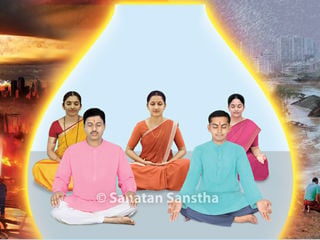Important instruction for seekers living in metros and big cities

Today, the population of Indian metros, as well as other major cities, is increasing day-by-day. The growing epidemic in such places has become a matter of grave concern for everyone.
Due to overcrowding in cities, lack of sanitation, increasing pollution, pre-dominance of Raja-Tama components, etc. the citizens are living under fear and insecurity. In times of war, riots, tsunamis, epidemics, etc. these cities may face more danger than the towns. Therefore, staying in cities, etc. can be dangerous.
1. The environment in a town or Taluka place is relatively safe
Compared with metros and towns, Taluka places have safer and healthier environment due to open-air, abundance of natural resources (sunlight, trees, etc.), less pollution, and the way of life also is self-reliant. The availability of essential commodities (water, vegetables, fruits, etc.) is also easier in the towns. If you have your own farm, you can make a living by taking to farming.
2. Seekers who have migrated to metropolises should
consider relocating to a town or Taluka place with their families
Some seekers who used to live in towns earlier have migrated to metropolises and big cities for education, jobs, business, etc. Considering the immense damage that can be caused to these cities in the adverse times, seekers living in metropolitan areas should consider moving to a town or Taluka place with their families.
They can also select a farmhouse in a safe place for staying. If your home town is unsafe and you cannot manage to live there, select a safe alternative town or Taluka place.
3. Consider the following important criteria when
selecting a town and home to live in the coming adverse times
3 A. There are several things to keep in mind when selecting a village or Taluka place

1. The village or Taluka place selected should not be too close to metros and big cities.
2. Make sure that the nearby towns too are relatively safe.
3. The town should not be prone to floods, volcanoes or earthquakes. Towns in potential flood areas where excess water from a dam may be released should not be selected.
4. Preference should be given to an alternative town instead of towns near the sea and river banks. This is because the sea level, as well as the flooding of the river, leads to a very high water level that can reach or cross the shores. This water can submerge towns near the coast. To avoid facing such a situation, towns which have a ground level 4 meters above the highest water level should be selected.
5. In areas near coal mines, there are fires. The fires burn the coal to ashes and this creates a vacuum under the ground, which later sinks. Therefore, a town in such an area should not be selected.
6. Explosions of flammable substances produced in large factories, industrial plants and cylinder warehouses can lead to great damage to the surrounding areas. Therefore, there should be no such factories or projects in the vicinity of the town.
7. Even during the adverse times, the town should have abundant supply of water, as well as availability of necessities (water, vegetables, fruits, etc.).
8. In many towns, it is difficult to communicate with others since there is no mobile connectivity. Therefore, ensure that there is a good communication system in the town.
9. Environment in the town should be conducive to spiritual practice as well as personal life. If you have a house in the town but if the environment is not complementary for spiritual practice, an alternative location should be considered.
3 B. The following minute details need to be studied in the context of your home
1. Your home should be in a Hindu-majority safe area.
2. Accidents take place due to various reasons such as unauthorised construction of slums, overcrowded settlements, as well as extreme unhygienic conditions, leading to the rapid spread of disease, explosion of cylinders, fires due to short circuit, etc. Hence, there should be no slum around the home area within 1-2 km radius.
3. It would be better if there are seekers around, and people who can help you.
4. Consider if performing sevas such as propagation of Dharma, cultivation of medicinal herbs, etc., is possible there.
3 C. It is better to get a house in a town or
Taluka place where all the above criteria will apply
A sattvik town or Taluka place will be protected more than a Raja-Tama predominant town or Taluka place. Therefore, while selecting a shelter, one should try to follow the criteria of sattvikata as well as the above aspects. Try to get a town and a house where all the above criteria will apply. If this is not possible, select a town and a house where the maximum criteria apply.
Make arrangements at home in
a town as preparedness for the adverse times !
Repair the house in your town and make it habitable. If you want to select a town or Taluka place according to the criteria mentioned in this article, go ahead and do it as soon as possible and make all the arrangements to live there. Solar energy equipment can also be purchased and stored. If all arrangements have been made there in advance, it will be convenient to leave the big cities and take shelter in the town to save your life as soon as the adverse times begin.
The seekers should take guidance from the local responsible seekers with-out taking their own decisions regarding the choice of the town or Taluka place, as well as migration there. Even if preparation as mentioned above have been made, do not migrate to a town as of now.
Understand that to consider moving to a safer town away from the metropolises and big cities is, in a way, preparedness for the adverse times !
Seekers should take guidance from the responsible seekers regarding the choice of the town or Taluka place, as well as migration there !

 Terrace gardening a lifeline for calamitous times (Part 2)
Terrace gardening a lifeline for calamitous times (Part 2) Terrace gardening a lifeline for calamitous times (Part 1)
Terrace gardening a lifeline for calamitous times (Part 1) Activities to be undertaken daily to maintain God’s grace and to build a protective shield...
Activities to be undertaken daily to maintain God’s grace and to build a protective shield... how to improve mental strength to face a terrible situation such as a riot
how to improve mental strength to face a terrible situation such as a riot Preparation required to survive during the adverse times Part – 10
Preparation required to survive during the adverse times Part – 10 Preparation required to survive during the adverse times part – 9
Preparation required to survive during the adverse times part – 9